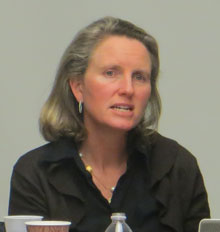The Arab Revolutions: Where Are They Now?
Isobel Coleman, Council on Foreign Relations
Photos

New York, NY—On January 31, 2014, Isobel Coleman, a senior fellow at the Council on Foreign Relations, discussed the state of the Arab revolutions at the WFPG event “The Arab Revolutions: Where Are They Now?” Coleman offered insight on happenings across the region, focusing on Egypt, Syria, Iran, and Tunisia. Throughout the discussion, Coleman emphasized the role that deep societal divisions played in fomenting revolution in the region, as well as the varied outcomes of the revolutions in each country. The program was moderated by WFPG President Patricia Ellis and co-sponsored by the Institute of International Education.
On Egypt, Coleman stated that the country “is worse off today than it was under Mubarak” as a result of the recent government restriction of political freedoms, the rise in terrorism, the preservation of military privileges, the abuse of human rights, and worsening economic troubles. She also commented on the prevalence of anti-Americanism in Egypt. The U.S., Coleman said, should have taken a stronger stand in support of democracy when the military ousted democratically-elected President Morsi after a popular uprising called for his removal. She argued that the current harsh crackdown by the military-backed government is not sustainable because Egyptians now have a sense of political consciousness that will not go away.
In Syria, Coleman described the current situation as one of “untold tragedy” and “untold humanitarian disaster” that she believes will continue. The Assad regime, backed by Iranian and Gulf money, has bolstered the most radical elements of the opposition, disadvantaging the more moderate opposition and provoking in-fighting among rebel groups. According to Coleman, bloody fighting could carry on for a long time, unless outside powers step in to negotiate a political settlement.
Discussing Iran, Coleman emphasized that the country attempted to co-opt the Arab revolutions as an “Islamic Awakening,” but had to abandon the approach when that narrative didn’t match up with the more secular, democratic elements leading the protests. She stressed the huge amount of money Iran has poured into Syria as Assad’s “number one backer” as another reason for Iran’s failure to co-opt the revolutions. Coleman depicted Iran as a case where revolution failed as a result of the government’s violent repression of the country’s 2009 protest movement. Looking forward, Coleman predicted that while Iran might move forward with deals with Western powers over the nuclear issue, the regime is unlikely to relax social and political controls.
In contrast with the other Arab revolutions, Coleman remarked that “Tunisia looks great, actually”. She highlighted the formation of coalitions and compromises rather than “zero-sum politics” among Tunisian political forces as the main reason for the country’s success relative to other regional revolutions. While the new constitution does have some contradictions, it is generally a good document, she said. Coleman discussed the serious economic issues facing the country, including unsustainable subsidy levels, over-employment by the government, and the high budget deficit, but expressed hope that Tunisia will soon carry out an economic reform program.
Although the media tends to focus on the plight of women in the Middle East, Coleman emphasized that “beneath the headlines, there’s actually a lot of positive things going on for women in the region.” Recent gains for women include a parliamentary seat quota of 27% in Tunisia, the creation of advocacy groups against sexual violence in Egypt, Yemeni leader Tawakkol Karman’s Nobel Peace Prize win, and the new one-third quota for seats for women on the Shura Council in Saudi Arabia.